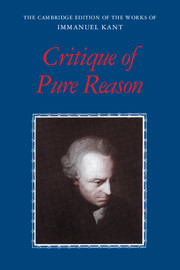Book contents
- Frontmatter
- Contents
- General editors' preface
- Acknowledgments
- Introduction
- Immanuel Kant, Critique of Pure Reason
- I Transcendental doctrine of elements
- Division one. Transcendental analytic
- Book I Analytic of concepts
- Chapter I On the clue to the discovery of all pure concepts of the understanding
- Chapter II On the deduction of the pure concepts of the understanding
- Book II Analytic of principles
- Appendix: On the amphiboly of concepts of reflection
- Remark to the amphiboly of concepts of reflection
- Division two. Transcendental dialectic
- II Transcendental doctrine of method
- Editorial Notes
- Glossary
- Index
Chapter II - On the deduction of the pure concepts of the understanding
from Book I - Analytic of concepts
- Frontmatter
- Contents
- General editors' preface
- Acknowledgments
- Introduction
- Immanuel Kant, Critique of Pure Reason
- I Transcendental doctrine of elements
- Division one. Transcendental analytic
- Book I Analytic of concepts
- Chapter I On the clue to the discovery of all pure concepts of the understanding
- Chapter II On the deduction of the pure concepts of the understanding
- Book II Analytic of principles
- Appendix: On the amphiboly of concepts of reflection
- Remark to the amphiboly of concepts of reflection
- Division two. Transcendental dialectic
- II Transcendental doctrine of method
- Editorial Notes
- Glossary
- Index
Summary
First Section
On the principles of a transcendental deduction in general.
Jurists, when they speak of entitlements and claims, distinguish in a legal matter between the questions about what is lawful (quid juris) and that which concerns the fact (quid facti), and since they demand proof of both, they call the first, that which is to establish the entitlement or the legal claim, the deduction. We make use of a multitude of empirical concepts without objection from anyone, and take ourselves to be justified in granting them a sense and a supposed signification even without any deduction, because we always have experience ready at hand to prove their objective reality. But there are also concepts that have been usurped, such as fortune and fate, which circulate with almost universal indulgence, but that are occasionally called upon to establish their claim by the question quid juris, and then there is not a little embarrassment about their deduction because one can adduce no clear legal ground for an entitlement to their use either from experience or from reason.
Among the many concepts, however, that constitute the very mixed fabric of human cognition, there are some that are also destined' for pure use apriori (completely independently of all experience), and these always require a deduction of their entitlement, since proofs from experience are not sufficient for the lawfulness of such a use, and yet one must know how these concepts can be related to objects that they do not derive from any experience.
- Type
- Chapter
- Information
- Critique of Pure Reason , pp. 219 - 266Publisher: Cambridge University PressPrint publication year: 1998

